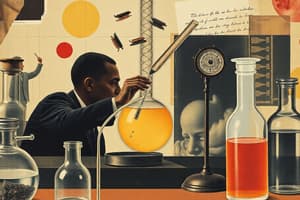Podcast
Questions and Answers
Which branch of science focuses on living organisms?
Which branch of science focuses on living organisms?
- Physical science
- Biological science (correct)
- Earth science
- Mathematical science
Scientific laws explain patterns observed in nature.
Scientific laws explain patterns observed in nature.
False (B)
What process involves observation, hypothesis formation, experimentation, data analysis, and conclusion?
What process involves observation, hypothesis formation, experimentation, data analysis, and conclusion?
Scientific method
Mathematics deals with patterns, measurements, and ______.
Mathematics deals with patterns, measurements, and ______.
Match the following mathematical branches with their focus area:
Match the following mathematical branches with their focus area:
What is the primary focus of English Language Arts (ELA)?
What is the primary focus of English Language Arts (ELA)?
Which of the following is NOT a key scientific principle?
Which of the following is NOT a key scientific principle?
The English language evolved from a root language called Old English.
The English language evolved from a root language called Old English.
Hindi is primarily spoken in countries outside India.
Hindi is primarily spoken in countries outside India.
Grammar includes the rules for ______ sentences and using vocabulary.
Grammar includes the rules for ______ sentences and using vocabulary.
Why is proficiency in Hindi important?
Why is proficiency in Hindi important?
Social Studies helps in understanding __________ structures and interactions.
Social Studies helps in understanding __________ structures and interactions.
Match the following components of Social Studies with their respective focus:
Match the following components of Social Studies with their respective focus:
Which aspect does Computer Science NOT cover?
Which aspect does Computer Science NOT cover?
Effective English communication contributes to personal and professional growth.
Effective English communication contributes to personal and professional growth.
What does proficiency in Hindi improve?
What does proficiency in Hindi improve?
Flashcards
Scientific Method
Scientific Method
A systematic approach to understanding the natural world, involving observation, hypothesis formation, experimentation, data analysis, and conclusion.
Scientific Law
Scientific Law
A description of a pattern in nature.
Scientific Theory
Scientific Theory
An explanation of a pattern found in nature.
Mathematics
Mathematics
Signup and view all the flashcards
Algebra
Algebra
Signup and view all the flashcards
Grammar
Grammar
Signup and view all the flashcards
Vocabulary
Vocabulary
Signup and view all the flashcards
Reading Skills
Reading Skills
Signup and view all the flashcards
Oral Communication
Oral Communication
Signup and view all the flashcards
English Language Arts (ELA)
English Language Arts (ELA)
Signup and view all the flashcards
Hindi Grammar
Hindi Grammar
Signup and view all the flashcards
SST Subject
SST Subject
Signup and view all the flashcards
Computer Science
Computer Science
Signup and view all the flashcards
Programming Language
Programming Language
Signup and view all the flashcards
Algorithm
Algorithm
Signup and view all the flashcards
Data Structures
Data Structures
Signup and view all the flashcards
Study Notes
Science
- Science is a systematic enterprise that builds and organizes knowledge in the form of testable explanations and predictions about the universe.
- Physical science studies non-living matter, including physics, chemistry, and astronomy.
- Biological science studies living things, including botany, zoology, and ecology.
- Earth science studies the Earth, including geology, meteorology, and oceanography.
- Scientific method involves observation, hypothesis formation, experimentation, data analysis, and conclusion.
- Key scientific principles include observation, measurement, experimentation, analysis, and communication.
- Scientific laws describe patterns in nature, while scientific theories explain those patterns.
- Scientific models are representations of complex phenomena to help understand and predict outcomes.
- Tools and techniques play a critical role in scientific investigation, from microscopes to telescopes to sophisticated lab equipment.
- Scientific advancements continuously reshape human understanding and technology.
Math
- Mathematics is a formal system of logic and reasoning used to quantify, measure, and describe patterns.
- Core mathematical concepts include numbers, operations, equations, functions, geometry, and data analysis.
- Arithmetic deals with basic operations of numbers like addition, subtraction, multiplication, and division.
- Algebra involves manipulating symbols and variables to solve equations and relationships.
- Geometry studies shapes, lines, angles, and their properties and relationships.
- Calculus deals with rates of change, limits, and infinite series.
- Probability and statistics involve analyzing data and drawing inferences.
- Mathematical tools are crucial for solving practical problems in various fields.
- Math's practical applications include engineering, finance, and computer science.
- Math's abstract nature allows for exploration of the fundamental structures of the universe.
English
- English language is a West Germanic language that evolved from Old English.
- Grammar encompasses rules for constructing sentences and using vocabulary.
- Vocabulary includes words and their meanings, crucial for clear communication.
- Literature includes prose, poetry, and drama, allowing expression of ideas, emotions, and experiences.
- Reading skills involve comprehension, vocabulary building, and critical analysis of texts.
- Writing skills involve organizing thoughts, structuring arguments, and using precise language.
- Oral communication includes speaking fluency, articulation, and effective delivery of messages.
- English Language Arts (ELA) encompasses all these components for developing communication skills.
- English is a global language used for education, business, and international relations.
- Effective English communication aids in personal and professional growth.
Hindi
- Hindi is an Indo-Aryan language primarily spoken in India.
- It's the official language of India and one of the most widely spoken languages in the world.
- Understanding Hindi grammar helps in constructing and comprehending sentences.
- Hindi vocabulary comprises words and meanings, relating them to culturally relevant concepts.
- Literary traditions and expressions in Hindi reveal India's cultural heritage.
- Reading and understanding Hindi script is essential for accessing Hindi literature and information.
- Proficiency in Hindi improves communicative abilities within the country.
- Spoken Hindi requires practice and familiarity with pronunciation nuances.
- Its connection to the country's history and culture makes it a necessary language.
- Hindi's versatility allows for expression in various forms, including poetry, prose, and storytelling.
SST (Social Studies)
- Social Studies (SST) is the study of humanity and its societies.
- It encompasses history, geography, civics, economics, and other related disciplines.
- History analyzes past events and their impact on the present.
- Geography explores the Earth's physical features and human societies' relationship with them.
- Civics studies the structure and functions of government and the rights and responsibilities of citizens.
- Economics examines production, distribution, and consumption of goods and services.
- SST helps in understanding societal structures, interactions, and patterns of development.
- It promotes critical thinking and awareness of the world.
- SST equips individuals with the knowledge and skills to participate and contribute responsibly as citizens and members of society.
- Understanding various cultures and historical events are crucial components of SST.
Computer
- Computer science is the study of computation, including algorithms, data structures, and programming.
- Computer systems encompass hardware, software, and their interactions.
- Programming languages allow humans to instruct computers to perform tasks.
- Algorithms are step-by-step procedures to solve problems.
- Data structures organize data for efficient access and use.
- Databases store and manage large amounts of information.
- Networking connects computers and devices to share resources.
- Cybersecurity protects computer systems and data from threats.
- Artificial intelligence (AI) involves developing machines that mimic human intelligence.
- Computer applications are prevalent in daily life, enabling automation and efficient work.
Studying That Suits You
Use AI to generate personalized quizzes and flashcards to suit your learning preferences.




